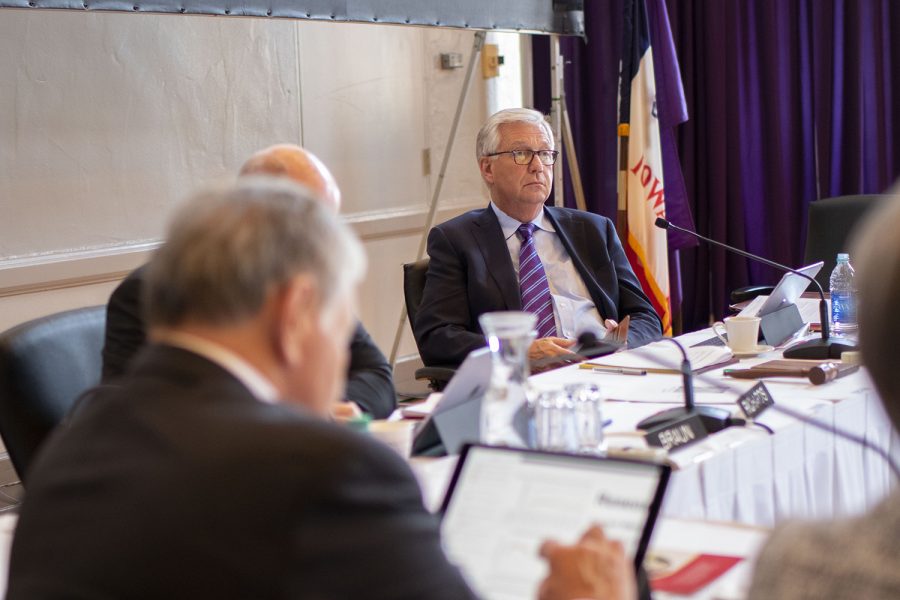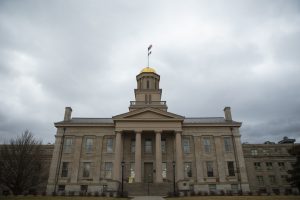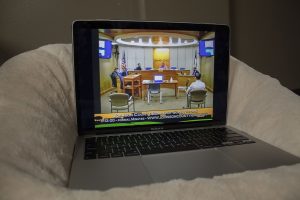Board of Regents President says tuition will not increase in the spring
State Board of Regents President Mike Richards announced tuition will remain the same for the spring 2021 semester for resident and nonresident students attending regent institutions at the board’s meeting Wednesday. The decision puts the board an entire academic year behind in its five-year tuition increase plan.
Regent President Mike Richards listens during the state Board of Regents meeting at the University of Northern Iowa in Cedar Falls on Friday, November 15, 2018.
November 18, 2020
The state Board of Regents will not increase tuition for students in the spring semester, but will return to it’s five-year tuition increase plan in fall 2021.
During regent President Mike Richards’ report Wednesday, he said the tuition and mandatory fees will remain flat for all students through the spring semester.
“The board will not be increasing tuition or mandatory fees for the rest of the academic year,” he said. “Because of COVID-19, pausing the five-year tuition model for one academic year was the right thing to do, but in balancing the needs for our future institutions, we are planning to resume the five-year tuition plan beginning with the fall 2021 semester.”
The regents initially froze fees for the fall semester because of the COVID-19 pandemic in June 2020. As The Daily Iowan previously reported, the decision was because of the financial uncertainty for students created by COVID-19.
At the regent’s June 4 meeting, several student government leaders from Iowa’s three public universities voiced their concerns about a potential mid-year tuition increase. University of Iowa Undergraduate Student Government President Connor Wooff voiced concerns at the summer meeting because of students losing jobs and other experiences during the pandemic.
“While our university came together this semester, our push for economic relief cannot be over,” Wooff said during the June meeting. “Students at the University of Iowa are still struggling and hurting because of the global pandemic, perpetual racial injustice, and the immense uncertainty about what is to come. Students need our support and our thoughts, but not just our actions.”
Overthe next few board meetings, Richards said the regents will release more details on how they will return to the five-year tuition model.
The five-year tuition model was approved by the regents at a June 2019 meeting. The model increased undergraduate resident tuition by 3.9 percent at the UI and a 1 percent increase for nonresident undergraduates for the 2019-20 academic year.
The 2019 model plans to increase the tuition at the UI and Iowa State University by 3 to 5 percent for the five years following 2019. Any increases above three percent would be based on state appropriation levels and inflation.
At Wednesday’s meeting, Richards also discussed the creation of a new regents committee regarding the insurance of free speech on campus.
“Everyone has the right to express their own opinion,” he said. “Disagreeing on issues and having a respectful debate about those issues should happen on our university campuses. What should not happen is preventing another person or group’s opinion from being expressed, or threatening those opinions with possible repercussions. This is not who we are. And it is not right.”
Richards said the institutional heads of regent institutions will need to provide a thorough update to the regents about what their institution is doing to protect free speech on campus and in classrooms. He said the board will not tolerate any violations of anyone’s freedom of speech.
Regents David Barker, Nancy Boettger, and Zack Liest were appointed to the committee. Leist is the student regent and attends Iowa State University. The committee is charged with evaluating the implementation of the board’s free speech policy that was established in 2019.
They will also bring any recommendations for changes that can strengthen the regent’s efforts on free speech to the February 2021 meeting.
“This is an issue we must address,” Richards said. “The conversation should be transparent and public.”






